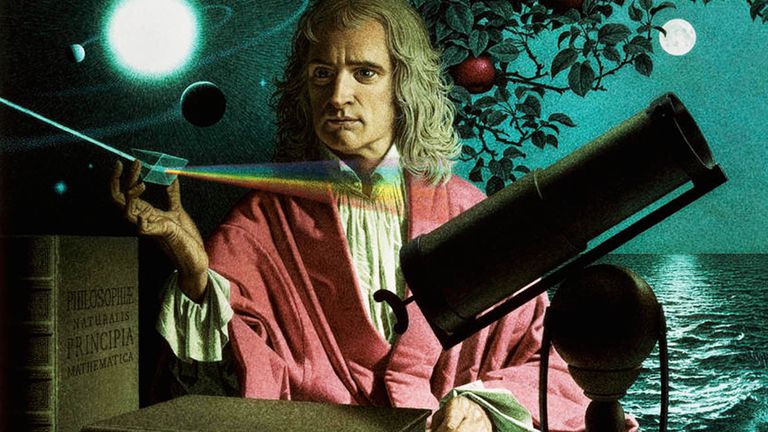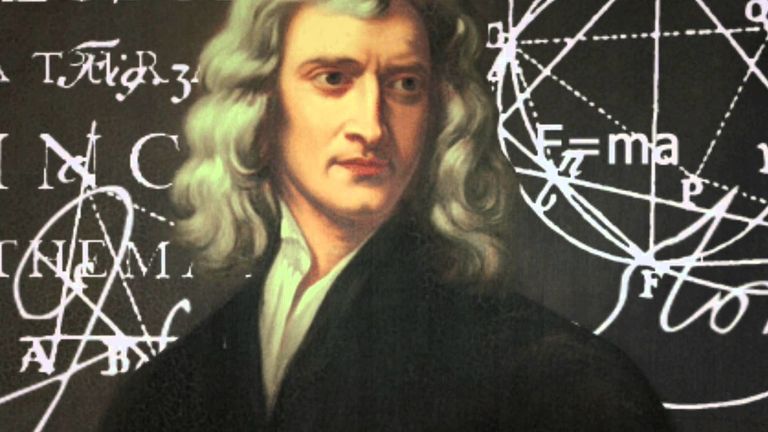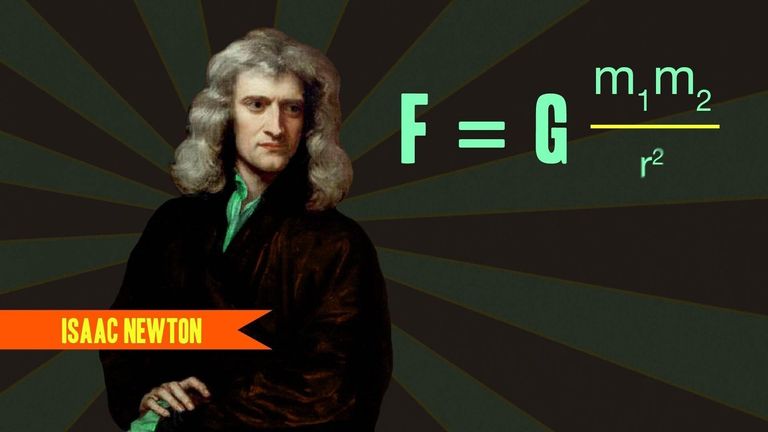ISAAC NEWTON 1642-1727
Nature and the laws of nature are hidden behind the night.
God said, let Newton exist! And everything will be bright.
Isaac Newton, the greatest and most influential scientist who ever lived, was born in Woolsthrope, England, on Christmas Day 1642, the year Galileo died. Like the Prophet Muhammad, he was born after his father died. As a boy he had shown a marked prowess in mechanics and was very dexterous with his hands. Although a child with a bright brain, at school he seems reluctant and does not attract much attention. When he reached puberty, his mother took him out of school in the hope that his son would become a good farmer. Fortunately the mother can be persuaded, that her main talent does not lie there. At the age of eighteen he entered Cambridge University. It was here that Newton quickly absorbed what was to become known in science and mathematics and quickly began to conduct his own investigations. Between the ages of twenty-one and twenty-seven he laid the foundations of the theory of science which in turn changed the world.
The middle of the 17th century was a period of germination of knowledge. The discovery of binoculars near the beginning of the century had completely changed the whole view of astrology. The English philosopher Francis Bacon and the French philosopher Rene Descartes both appealed to scientists throughout Europe to no longer rely on Aristotle's power, but to conduct experiments and research on the basis of their own starting point and needs. What was proposed by Bacon and Descartes, has been put into practice by the great Galileo. Newton's use of binoculars, a new invention for astronomical research, revolutionized the investigation of the field, and his work in mechanics resulted in what is now known as Newton's first "laws of motion".
Other great scientists, such as William Harvey, discoverer of the circulation of blood and Johannes Kepler, discoverer of the motion of the planets around the sun, provided very basic information for scholars. Even so, pure science is still a hobby of intellectuals, and it has not yet been proven - when used in technology - that science can change the basic pattern of human life as predicted by Francis Bacon.
Although Copernicus and Galileo have kicked aside some of the rambling assumptions about ancient knowledge and have presented a more general understanding of the universe, there is not a single carefully formulated point of view that is able to divert the heaps of meaningless and unfounded understanding while compiling them in one form. theory that allows the development of more scientific predictions. None other than Isaac Newton was the one who was able to present a collection of theories that were neatly summarized and laid the first stone of modern science which is now the trend of people.
Newton himself was rather reluctant to publish and announce his findings. His basic ideas had been formulated long before 1669 but many of his theories were not known to the public until many years later. The first publication of his discovery was concerned with overturning the old notion of light. In a series of careful experiments, Newton discovered the fact that what people commonly call "white light" is actually nothing but a mixture of all the colors contained in the rainbow. And he also very carefully analyzes the consequences of the laws of reflection and refraction of light. Adhering to this law he --in 1668--designed and simultaneously built the first reflecting telescope, the model of binoculars used by most astronomers today. This discovery, together with the results obtained in the field of optical experiments which he had demonstrated, were presented by him to the British royal research institute when he was twenty-nine years old.
Newton's success in the field of optics alone may be enough to place Newton on the list of this book. Meanwhile, there are discoveries that are less important in the field of pure mathematics and in the field of mechanics. His greatest contribution to mathematics was his discovery of "integral calculus" which he might have solved when he was twenty-three or twenty-four. This discovery is the result of the most important work in the field of modern mathematics. It is not only the seed from which modern mathematical theory grows, but also the inevitable furniture without which the advancement of modern knowledge that would follow would be impossible. Even if Newton did nothing more, his discovery of "integral calculus" alone was sufficient to lead him up the ladder high in this book's chronological list.
But Newton's most important discoveries were in the field of mechanics, the knowledge around the motion of objects. Galileo was the first to discover the law that describes the motion of an object when it is not influenced by external forces. Of course basically all objects are affected by external forces and the most important issue in mechanics is how objects move in that state. This problem was solved by Newton in his second and famous law of motion and can be considered the most important law of classical physics. The second law (matmatically described by the equation F = m.a) stipulates that the acceleration of an object is equal to the net force divided by the mass of the object. To these two laws, Newton added his famous third law of motion (affirming that in every action, such as a physical force, there is an equal reaction to the opposite) and his most famous discovery of the scientific principle of the law of universal gravity. These four sets of laws, when combined, will form a unified system that applies to all macro-mechanical systems, from the wobble of the pendulum to the motion of the planets in their orbits around the sun that can be monitored and their movements can be predicted. Newton not only established the laws of mechanics, but he himself also used the tools of mathematical calculus, and showed that these fundamental formulas could be used for problem solving.
Newton's laws can and have been used on a wide scale in the scientific field as well as in the design of various technical equipment. In his lifetime, the most dramatic practice was in the field of astronomy. In this sector, Newton stood at the forefront. In 1678 Newton published his famous book Principles of mathematics on natural philosophy (usually abbreviated Principia only). In that book Newton put forward his theory of the law of gravity and of the laws of motion. He showed how these laws could be used to predict precisely the motions of the planets around the sun. The main problem of astronomical motions is how to estimate the exact position and motion of the stars and planets, thus being completely solved by Newton with just one stroke. For his works Newton is often considered the greatest astronomer of all the greatest.
What is our assessment of the importance of Newton's science? If we browse through the index of the encyclopedia of science, we will find about Newton and his laws and discoveries two or three times more than any other scientist. Said the great scholar Leibniz who was not at all close to Newton and even got involved in a heated argument: "Of all things related to mathematics from the developing world to the existence of Newton, it was this person who made the best contribution." Also praise was given by the great French scholar, Laplace: "Newton's Principia is far above all the products of human genius in the world." And Langrange often stated that Newton was the greatest genius who ever lived. While Ernst Mach in writing in 1901 said, "All mathematical problems that have been solved since his lifetime is the basis for the development of mechanics based on Newton's laws." This is perhaps Newton's most complex major discovery: he found a receptacle for the separation between fact and law, able to describe some miracles but little help to make conjectures; he left us with a unified set of laws that can be used for physics problems in a very wide secret scope and contain the possibility to make precise assumptions.
In such a concise description, it is impossible to describe in detail Newton's discoveries. As a result, many works that are somewhat less well known have to be put aside even though they have an important meaning in terms of discovery in their own problem area. Newton also made major contributions in the field of thermodynamics (the study of heat) and in the field of acoustics (the study of sound). And it was he who also presented a crystal clear explanation of the principles of physics about "preserving" the amount of motion so as not to be wasted and "preserving" the amount of motion of something angular. This queue of discoveries can be extended further: Newton was the one who discovered the binomial theorem in mathematics which is very logical and can be accounted for. Want to add more? He was also, none other than, the first to conclusively state the origin of the stars.
Well, now the problem is this: put Newton as the greatest scientist of all scientists who have ever lived on earth. The most gleaming like an emerald in the middle of a pile of river stones. Put it that way. However, there may be people who question the reason for placing Newton above the leader of giant politicians such as Alexander the Great or George Washington, and being mentioned before big religious figures such as Prophet Isa or Gautama Buddha. Why must that be?
My consideration is this. It is true that political changes are important if not very important. Even so, after all, in general, the majority of humans lived almost not much difference between them in the five hundred years after Alexander died and those in the five hundred before Alexander emerged from his mother's womb. In other words, the way humans lived in 1500 BC is practically the same as their great-great-great-grandfather's way of life in 1500 BC. Now, look at it from the point of view of the development of science. In the last five centuries, thanks to modern scientific discoveries, the daily way of life of people has undergone a major revolution. The way of dressing is different, the way of eating is different, the way of working and the variety is different. In fact, the relaxed way of life is not at all similar to what people did in 1500 AD. Scientific discoveries have not only revolutionized technology and economics, but have also completely changed the aspects of politics, religious thought, art and philosophy. It is very rare that aspects of human life remain "squat in place" without moving an inch with the scientific revolution. It is this reason--again this reason--that is why so many scientists and inventors of new ideas are listed in this book list. Newton was not only the most intelligent brain among the intelligent brain line, but at the same time he was the most influential figure in the development of scientific theory. That's why he has the honor to be placed at the very top of the list of the most influential people in human history. Newton breathed his last in 1727, was buried in Westminster Abbey, the first scientist to receive such honor.

Source
Isaac Newton, a natural philosopher who is generally regarded as the most original and influential theorist in the history of science. His discoveries in science were differential and integral calculations (calculus), a new theory of light and color, Newton also changed the structure of physical science with the three laws of motion and the law of universal gravitation. As the key to the scientific revolution of the 17th century, Newton's work combined the contributions of Copernicus, Kepler, Galileo, Descartes and others into a new and powerful synthesis.
After publishing the Principia on July 5, 1687, the book stated the three laws of motion that formed the basis of classical mechanics, the law of universal gravitation and the derivation of Kepler's laws previously obtained empirically. Newton became more involved in public affairs. In 1689 he was elected to represent Cambridge in Parliament and during his stay in London he became acquainted with John Locke, the famous philosopher and Nicolas Fatio de Duillier, a brilliant young mathematician who became a close friend of Newton.
In 1693, Newton somehow suffered a severe nervous breakdown, after he recovered, in 1696 with the help of Charles Montague, a colleague of Trinity, Newton was appointed Warden and later Master of the Mint. His new position proved the most appropriate for him, he left Cambridge for London with no regrets. During this time, Newton enjoyed worldly power and success. His position at the Mint provided him with comfortable social and economic status and he became an active and capable administrator. In 1703, following Hooke's death, Newton was elected President of the Royal Society and was re-elected annually until his death.


